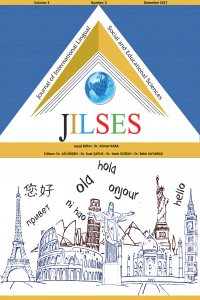THE SOCIAL PROBLEMS OF STUDENTS IN THE VOCATIONAL SCHOOL TO USE SOCIAL NETWORK: QUALITATIVE STUDY
The aim of the study is to determine the opinions of students in Develi Vocational School about their social problems prompting them to use social networks. The qualitative research method was used in this study and phenomenology design was taken into consideration. The sample of the study consisted of students studying in Erciyes University Develi Vocational School in fall semester of the 2014-2015 academic year. The sample group was determined according to criterion sampling. The data of the study were analysed by using a computer program appropriate for the qualitative data analysis by being collected from a total of 15 students through a semi-structured interview form prepared by the researchers and consisting of open-ended questions. In analyses, descriptive analysis technique was used. As a result of the study, social problems prompting the students to use social network were collected under five categories. These categories were determined as problems caused by social environment, decreased social activities, transportation to city centre, personal characteristics, and finance. Due to limited social environment and social activities for which they spent time in the campus and district, time they spent on the internet and their social network addiction were found to increase. They had difficulties in establishing communication within the campus and with people of the district due to social and cultural reasons and they stated that they spent more time on social networks due to these reasons. Moreover, another results were that the students had an increased social network addiction due to problems in transportation network between the district and city centre, financial problems of the students and their personal characteristics.
Anahtar Kelimeler:
Social networks, addiction, social problems
THE SOCIAL PROBLEMS OF STUDENTS IN THE VOCATIONAL SCHOOL TO USE SOCIAL NETWORK: QUALITATIVE STUDY
The aim of the study is to determine the opinions of students in Develi Vocational School about their social problems prompting them to use social networks. The qualitative research method was used in this study and phenomenology design was taken into consideration. The sample of the study consisted of students studying in Erciyes University Develi Vocational School in fall semester of the 2014-2015 academic year. The sample group was determined according to criterion sampling. The data of the study were analysed by using a computer program appropriate for the qualitative data analysis by being collected from a total of 15 students through a semi-structured interview form prepared by the researchers and consisting of open-ended questions. In analyses, descriptive analysis technique was used. As a result of the study, social problems prompting the students to use social network were collected under five categories. These categories were determined as problems caused by social environment, decreased social activities, transportation to city centre, personal characteristics, and finance. Due to limited social environment and social activities for which they spent time in the campus and district, time they spent on the internet and their social network addiction were found to increase. They had difficulties in establishing communication within the campus and with people of the district due to social and cultural reasons and they stated that they spent more time on social networks due to these reasons. Moreover, another results were that the students had an increased social network addiction due to problems in transportation network between the district and city centre, financial problems of the students and their personal characteristics.
Keywords:
Social Networks, addiction,
___
- Akyurt, N. (2009). “Meslek Yüksekokulları ve Marmara Üniversitesi Sağlık Hizmetleri Meslek Yüksekokulu Öğrencilerinin Genel Profili”. Fırat Sağlık Hizmetleri Dergisi, 4(11), 175-189.
- Bilen, K., Ercan, O. ve Gülmez, T. (2014). “”Sosyal ağların kullanım amacı ve benimsenme süreci; Kahramanmaraş Sütçü İmam Üniversitesi Örneği”. Eğitim ve Öğretim Araştırmaları Dergisi, 3(1), 115-123.
- Dikme, G. (2013). Üniversite Öğrencilerinin İletişimde ve Günlük Hayatta Sosyal Medya Kullanım Alışkanlıkları: Kadir Has Üniversitesi Örneği. Yayımlanmamış Yüksek Lisans Tezi, Kadir Has Üniversitesi, Sosyal Bilimler Enstitüsü, İstanbul.
- Fuat, N. ve Him, T. (2013). Üniversite Öğrencilerinin İnternet Kullanım Durumları Ve Saldırganlık Düzeyleri Arasındaki Korelasyon: GAÜ Psikoloji Ve Rehberlik Ve Psikolojik Danışmanlık Bölümü Öğrencilerinde İnternet Kaynaklı Tutum Değişiklikleri, II. International Conference on Communication, Media, Technology and Design, Famagusta – North Cyprus Kongresinde Sunulmuş Bildiri.
- Kalkan, M. ve Kaygusuz, C. (Ed.). (2013). İnternet Bağımlılığı Sorunlar ve Çözümler. Ankara: Anı Yayıncılık.
- Örs, F. (2003). “Meslek Yüksekokullarının Toplumsal İşlevi Bir Meslek Yüksekokulunun Kurumsal İmaj Araştırmas”ı. Muğla Üniversitesi Sosyal Bilimler Enstitüsü Dergisi, 1-16.
- Özmen, F., Aküzüm, C., Sünkür, M. Ve Baysal, N. (2012). “Sosyal Ağ Sitelerinin Eğitsel Ortamlardaki İşlevselliği”. E-Journal of New World Sciences Academy, 7(2), 496-506.
- Tiryakioğlu, F. ve Erzurum, F. (2011). Bir Eğitim Aracı Olarak Ağların Kullanılması. 2nd International Conference on New Trends in Education and Their Implications, Antalya, Turkey Kongresine Sunulmuş Bildiri.
- Tonta, Y. (2009). “Dıjıtal Yerliler, Sosyal Ağlar Ve Kütüphanelerin Geleceği”. Türk Kütüphaneciliği, 23(4), 742-768.
- Yıldırım, A. ve Şimşek, H. (2013). Sosyal Bilimlerde Nitel Araştırma Yöntemleri, (Genişletilmiş 9. Baskı). Ankara: Seçkin Yayıncılık.
- YÖK, Yükseköğretim Kanunu (Kanun No: 2547 Kabul tarihi: 4.11.1981)
- Yayın Aralığı: Yılda 2 Sayı
- Başlangıç: 2015
- Yayıncı: Ahmet KARA
